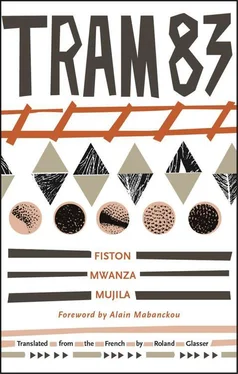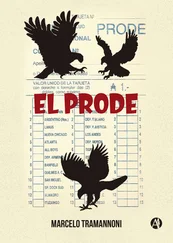“Requiem, my merchandise, don’t you dare try and stiff me, or you’ll see what I’m really capable of!”
His day had got off to a bad start. Four dreams he’d had, the first two in the morning and the other two in the afternoon, common denominator: a railroad without tracks, miners engulfed, cherry-popped baby-chicks, and students wasted away by the strike, for-profit tourists heading back home, the busgirl with the fat lips stabbed by a mercenary … From the very first dream, he had a foreboding that something bad was going to happen to him.
He hung up without saying a word. He closed the shutters. He picked up a volume lying on a shelf of the small bookcase. Buried his nose in it.
Another phone call.
“Requiem, my merchandise is sacred!”
Ever since he’d been bed-bound, he regularly received calls for the Negus laden with death threats. He had even gotten adjusted to this rain of blackmail that fell every half hour. He hung up, returned to the publication. 7:16 P.M. Another phone call. He continued his reading. The telephone was insistent. He hesitated, then picked up the receiver, exhausted by these gymnastics.
“Good evening, Ferdinand Malingeau. May I speak with Mr. Lucien?”
“What do you want with me?”
He answered, after rather a long silence:
“Yes, Mister Lucien, I must first of all beseech your forgiveness for the other evening. Your friend gave me to understand that you were going through a bad patch and needed a little more money.”
“So?”
“I am still interested in your literature and I would like to meet to discuss things.”
“Can you leave me the hell alone?”
“Sir … It is for your benefit. Your friend told me all about the difficulties you’re currently experiencing. I thought, after the five thousand dollars, to come to your aid again.”
“What five thousand dollars?”
He was dumbstruck.
“The five thousand I gave to your friend as compensation!”
He was speechless.
“Do you have any other texts?”
Five thousand dollars, damn that Requiem! He shook with rage.
“Can you hear me, sir, see you at the Tram at 11 P.M. at the latest?”
“That’s perfect.”
He collapsed onto the couch. The phone rang:
“Hi, Lucien, Requiem here, I won’t be back this evening.”
For the past week, Requiem had been ringing to apologize for not being able to come home, on the pretext of some deal to tie up.
“Ok.”
“Hi, Lucien, what’s with you, my blood brother?”
“Nothing.”
He hung up surreptitiously for fear of uttering some idiocy. He nodded off.
The phone rang:
“Requiem, my merchandise or nothing, it’s a matter of life or death …”
He suddenly had a crazy idea. A leap into the void. He thought of Jacqueline, and replied without mincing his words:
“Requiem, my merchandise, Requiem, my merchandise, shut it!”
He got back to his reading. 7:47 P.M. He stood up, took the only beer sitting in the fridge, went out, his imitation-leather bag under his arm, and tried the broken-down elevators.
IF EVERYONE WERE LIKE REQUIEM, THERE WOULD NEVER BE ANY POVERTY. HE KNEW WHERE AND PRECISELY WHEN TO STRIKE. WHETHER HE RETURNED WITH A CRIPPLED LEG AND A RIPPED EAR, HE SET OFF AGAIN THE FOLLOWING MORNING, HEAD HELD HIGH: REQUIEM, FOR AN IDENTITY REGAINED.
Requiem brought Lucien ten newspapers a week. He went without his smokes to provide him with “food for the mind,” as he liked to banter. Lucien was terribly ashamed when he saw him reach into his haversack and pull, from between two sandwiches, the newspapers he triumphantly handed him like a poker player laying down his last cards. Lucien paid no mind to the joy Requiem procured from this humanitarian service, but, over time, the Negus started to go too far. He used his actorly qualities against him. His little performance was mechanical, yet not without purpose: that Lucien would tire and eventually move out!
Requiem often returned home around 11 P.M., sometimes even later, much later, pushed open the door with his left foot, leered at him, greeted him, set down his near-sighted glasses, questioned him about the health of his characters, wanted to know if Lucien had got himself something to eat, if Lucien actually read the ads, took off his grubby vest, his scuffed kicks, his socks, and trained his little eyes on him for a long while before continuing with the stage that tortured him the most. With a writer’s sensibility, Lucien grasped the four sequences of his choreography:
1) Arrival of the angel, heaven is lower than earth.
2) Undressing as the stage preceding creation.
3) Trial by ordeal or the survival instinct of a sleepwalking, lazy, wretched king.
4) Assassination and the bagging-up of my bones.
It was this last sequence that finished him. Picking up his Pandora’s box, or haversack, Requiem set it right down on the dining-room table. He mastered Lucien’s psychology as he did that of his prostitutes. He heckled him: “You writers, I wonder what you write about!” When Lucien attempted to escape to the sanitary facilities or the kitchen, he rushed after him, pursuing the interrogation, blow by blow, about what was afoot in the Back-Country, while extracting from his chow bag the newspapers he triumphantly handed him with a sarcastic air, insinuating every thirty seconds that Lucien didn’t read the ads, all the new ones.
“RULE NUMBER 74: this is how you snag a job here, you sniff out the ads, you phone and they hire you, no pity for centipedes like you who twiddle their thumbs. Me here, Requiem, I hate jerks who don’t want to find work.”
As his temper flared, Requiem stood there like a foreign-language teacher, reading aloud to him the ads he thought suited his profile:
Waiter or waitress:
to work every day of the week except Saturday and Sunday.
Work attire is compulsory: pants or skirt, white blouse, black jacket.
He piled it on: “You gotta grab any opportunity, jobs are fought over, it’s another world here, New Mexico, fall asleep and they’ll fall on you!” Continued in a neutral tone: “Gotta know how to land on your feet anyplace, there’s not just your literature can earn you a crust, statistics prove in black and white that these days studies only serve to boost your pride. And you know what? It’s you intellectuals who’ve wrecked this country!”
Requiem was loath to spruce up his studio apartment since Lucien would be the prime beneficiary. He left home early in the morning and returned only late at night, head held high, chest puffed out, pants up over his bellybutton. Then skedaddled that same night to deliver some merchandise or sling back the booze at Tram 83. Requiem knew that Lucien suspected him of being mixed up in shady dealings. He knew that Lucien was not unaware that he purposefully kept his kennel in a pitiful state.
“We’re never at home, what point is there in us getting any furniture,” he said every thirty seconds.
It wasn’t for lack of money.
HAWKERS OF SECONDHAND COFFINS.
In the time it took to reach the stairs, a thud, blackout. He hurried down. The young boys of the building took advantage of such circumstances to dump in the stairwell. Vigilance and perceptiveness were required, or else risk tramping through waste. RULE NUMBER 25, as reiterated by the Negus: the stairwells of New Mexico sometimes serve as public latrines.
“My arm, my arm.”
He had stumbled during his frantic dash, and fallen on his left hand, which was barely healed. He picked himself up, furtively gathered his texts, tiptoed downstairs, and knocked shoulders with the girls on the fourth floor who were blocking the way.
Читать дальше












